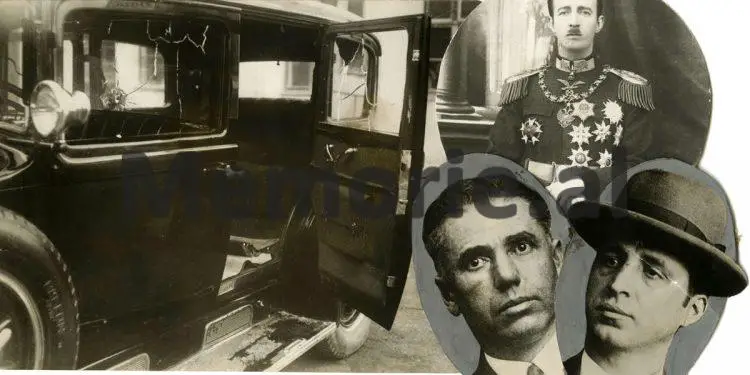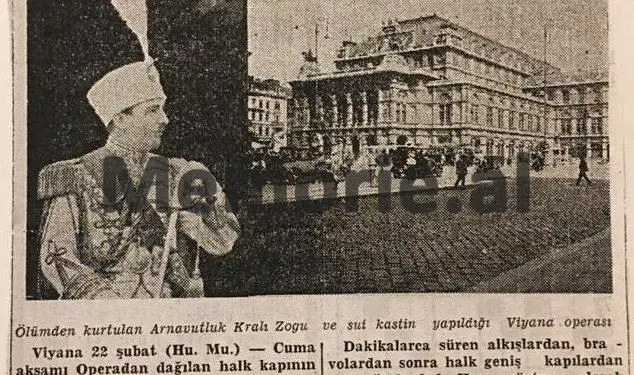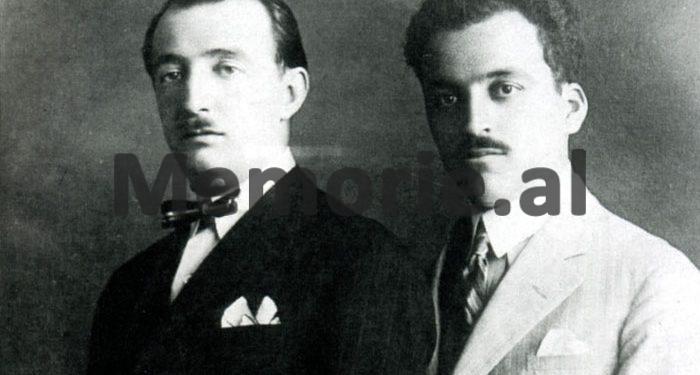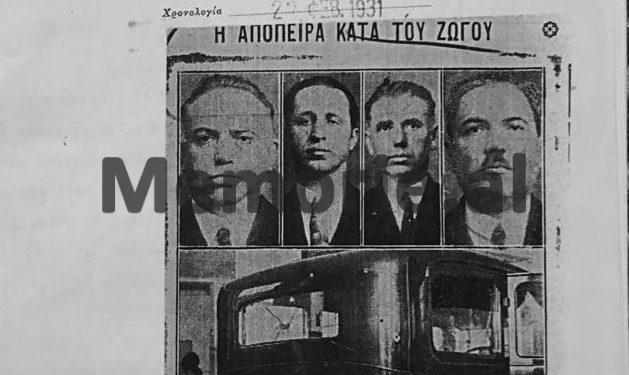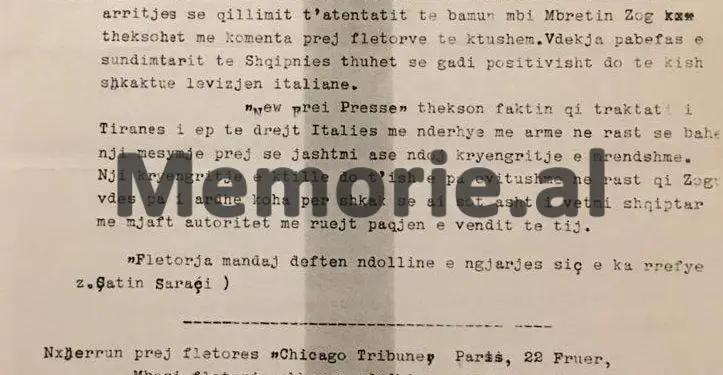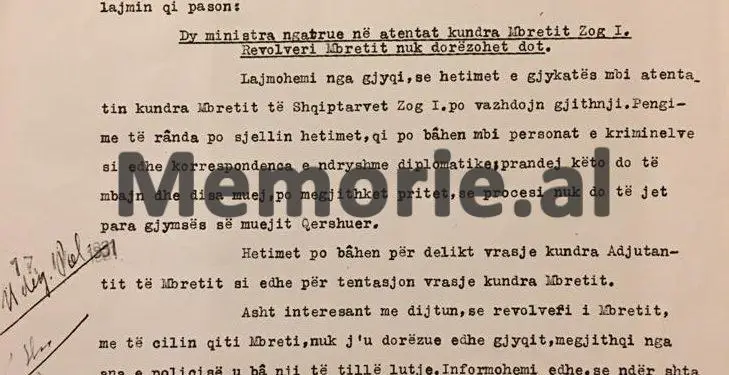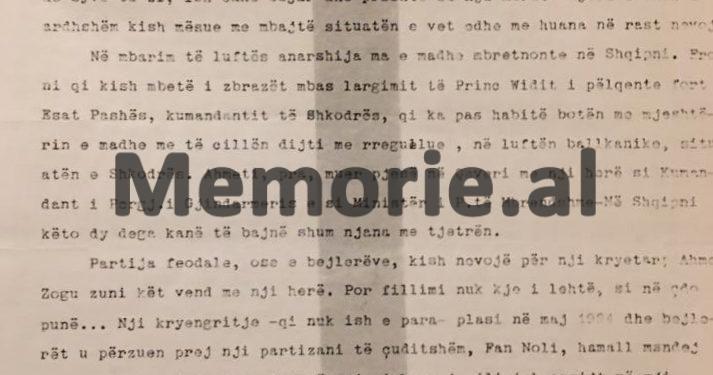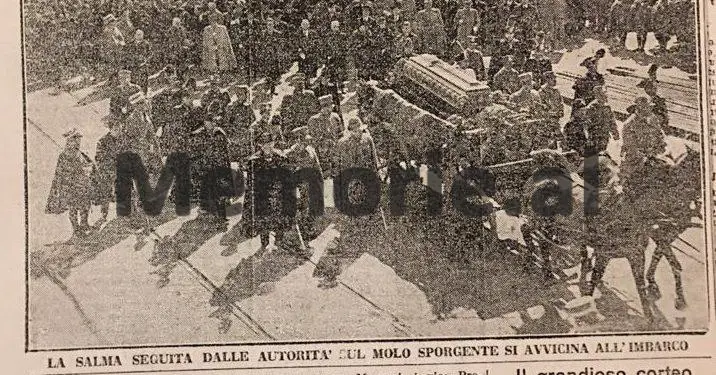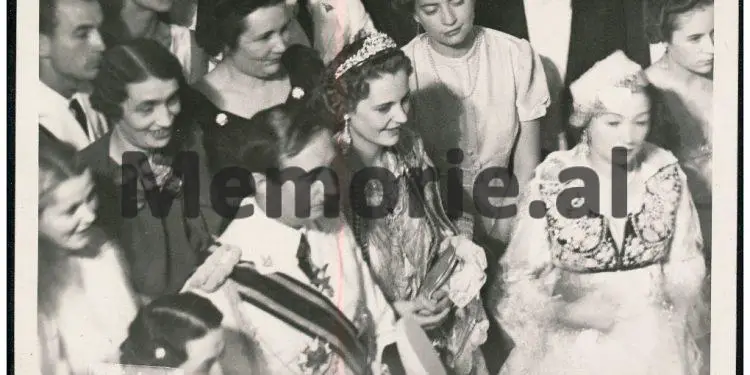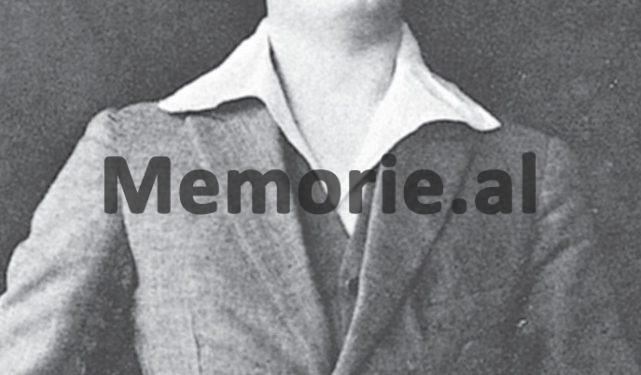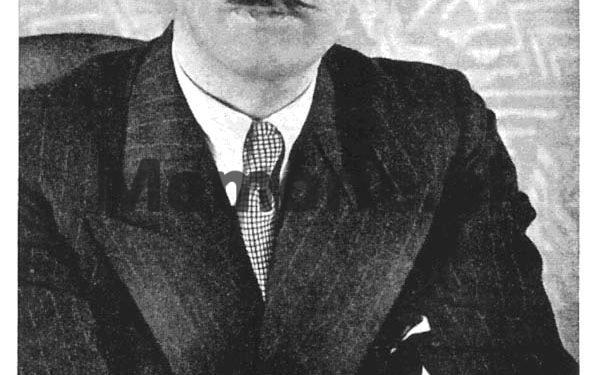Dashnor Kaloçi
Second part
Memorie.al publishes the unknown story of the assassination attempt on King Zog on February 20, 1931 while he was in Vienna for treatment, by a group of Albanian political emigrants living in the Austrian capital, led by Ndok Gjeloshi, Aziz Çami, two former officers of the Albanian Army who had taken part in the June 1924 Uprising, as well as Qazim Mulleti and Angjelin Suma, who after ambushing at the main gate of the Vienna Opera House, shot several times with their revolvers against Zog and his adjutants, while he was getting into his vehicle that was waiting for him nearby, leaving Major Llesh Topallaj killed on the spot and injuring the Minister of Foreign Affairs of Albania, Ekrem bej Libohova . How was that news and the whole story of the assassination of King Zog that miraculously escaped unaffected by the assassins’ bullets, in the biggest newspapers in Europe and the USA, such as: “The New York herald”, ” “Daily Telegraph”, “Daily Express”, “Chicago Tribune”, “Moring Post”, “Universul”, “Daily Herald”, etc., which found the opportunity and published for several months on their pages dozens of articles, where In addition to the event in question, many articles were dedicated to King Zog’s friendship with the Austrian baroness Maria de Janko and her sister, Franciska de Janko, who had been in Tirana for some time and with Zog’s visit to Vienna, they too had gone. there being accommodated in the Hotel “Regina”, where the King of Albanians during all those days, often frequented them and went for walks with them in the most beautiful parks of Vienna.
“A savage attack on the King of Albania Zog, took place late tonight in Vienna where the King had come to recover from Nevrostenia and nicotine poison. King Zog with his suite and some Austrian officials had just left the Opera House where he was playing “The Legend of Joze”, contacted by Richard Strau, and as he was taking his place in the car waiting for him outside the opera, revolver blasts were heard. on both sides of the car. The assailants, two people dressed well in their clothes at night, fired rifles at the windows of the car from a close distance. Zog’s men surrounded the car and pulled the revolvers out of their belts and fired at the catapults with a coolness, presumably at the top of the mountains in the heart of Albania and not near the great Vienna Opera. Major Topollaj, one of the King’s suites, together with a braver minister, sacrificed their lives to bravely face the rain of bullets in order to save their King. Topallaj fired four times with a revolver before falling to the ground before a bullet hit him. The Major, his minister, Marshall Libohova, who has a large body, fell to the ground before the King and continued to lie on the benches, which were repulsed until he received a bullet in the dagger. Twelve more were made upon the King, and his salvation seemed a marvelous thing. The Katilas, unable to achieve their goal, managed to escape, but the people of Vienna, angered by the use of the generosity of their city, seized the Katilas and beat them badly, until the police arrived. Both cats were sent to a prison and are now being questioned. “King Zog, who kept his cool during this event, took a car and went to the Imperial Hotel on the Ring Strasse, where he has lived since he came to Vienna.”
This is what is written, among other things, in the British newspaper “Daily Express” dated February 21, 1931, which in its main pages gave the news of the assassination of King Zog by a group of Albanian political emigrants led by : Ndok Gjeloshi, Aziz Çami, Qazim Mulleti and Angjelin Suma, who lived as asylum seekers in the Austrian capital, who after making the plan to kill Zog, that day had ambushed in front of the main entrance of the Vienna Opera House, where the King of Albanians accompanied by his adjutant, Major Llesh Topollaj and the Minister of Foreign Affairs, Ekrem bej Libohova, were watching the performance of the opera “Legenda e Joze”, and the moment they got out and got into the vehicle waiting for them near the gate of the Opera House, they fired several bullets from their revolvers, leaving the King’s adjutant, Major Llesh Topollaj, dead on the spot and injuring the Minister of Foreign Affairs, Ekrem bej Libohova, who with his body defended Zog, who with his revolver, fired several times at the assassins.
Regarding this event which was made public only after the ’90s, Memorie.al has provided a voluminous file from the Archive of the Ministry of Foreign Affairs in Tirana, (which is published for the first time), where there is a correspondence of the Ministry of Foreign Affairs of the Zog Monarchy with the Albanian Consulate in Vienna, which, among other things, sent to Tirana all the photocopies of the most famous newspapers of Europe and the USA, which for several months, devoted much writing to the event in question. All these articles translated at the Ministry of Foreign Affairs in Tirana as well as various archival documents about the event of the assassination of King Zog, Memorie.al is publishing them in several issues in a row, starting from today’s article and giving them in the written language of that time, without any changes as they appear in the relevant file.
Continued from the previous issue
The world press on the event of the assassination of King Zog in Vienna
Taken from the “UNIVERSUL” Notebook no. 53. dated 26 / II / 1931)
AFTER THE ASSASSINATION AGAINST THE KING OF ALBANIA
A LOVING NOVEL- VIENNA POLICE SURVEY
VIENNA 23 (ULLSTEIN)
An afternoon notebook writes that King Zog did not extend his stay in Vienna because of his stomach ailment, but Ay did not extend it for another reason.
Baroness Francisca de Jankoze has been in Vienna since January 14, coming from Tirana, together with her sister, Maria de Janko. Both live in the hotel “REGINA”.
There have long been close ties between King Zog and Marise Janko. The sisters are of Albanian origin and are not from a good tribe, but as the notebook announces, they are the sisters of a Viennese Albanian gardener named Janko. Katherina, the third sister of the grader, is married to an Austrian locomotive conductor named Stoll.
Francisca and Maria de Janko lived in Tirana for the last few years. It is said that because of his love for Mary, King Zogu, I refused the hand of the Italian Princess, who was chosen for him.
Some time ago, King Zog bought for Maria de Janko, a blane for the princess ermine, and they were photographed, which cost over 168 thousand lei.
The king often visited these two sisters at the REGINA Hotel.
On the day of the assassination, the King gave the sisters a (rendez-vous) baking at the WENSTINMESTER BAR, after the Opera show was over.
The sisters waited, not in vain, and later called the “Imperial” hotel where the King resides, after learning of the assassination attempt.
ALBANIANS EXPLOITED FROM AUSTRIA
Vienna 23 (Ulstein)
Following the investigations carried out by the Albanians here, 21 of them, whose dangerous letters were found, will be expelled outside Austria.
“DAILY HERALD” on 24 February 1931
WHY THE BIRD KING STAYS IN VIENNA
NOVEL WITH AN ACTRESS AND THE DAUGHTER OF A BAHCEVANI
From our correspondent, Vienna, eat it
In the fascination and music of Vienna, far from the strong mountains of their country, a King and his daughter are looking for a novel. The whole world has been thinking about what keeps King Zog of Albania, the unmarried monarch of Europe, in Vienna, where a conspiracy has been hatched and they have been shooting at him since the first days of January. And now the answer has come: Baroness Franciska de Janko, an attractive 25-year-old, is an actress and the daughter of a gardener. This has been a baroness since she became a friend of the King. She does not live far from the hotel. King Zog, has been locked up since Friday, when a bullet destined for him, killed his friend, Major Topallaj, at the door of the Opera. Françiska has come from the capital of Albania, Tirana, together with her sister Maria, and stays in a comfortable hotel of environmental class. The third sister, who lives in Vienna, is married to a locomotive waiter. The king met Francisco in Italy when she was an actress and he was powerful, but without crowns. She went to Tirana, a little later when Zogu won his crown. It is said that King Zog was to marry a girl from a powerful royal family in Europe. There has been a lot of talk about such a thing. It is assumed that Italy, which has participated in the affairs of Albania, may prefer such a queen.
THE NOVEL OF A KING
Baroness Francesca de Janko, a young Viennese, the affectionate friendship of which an Austrian newspaper reports, was the reason why King Zog of Albania remained in Vienna, despite the orders of his doctor. And so, he exposed the vein to the assassination attempt on his life that took place on Friday. The Baroness and her sister occupied the nearby lodge, at the Opera House where the assassination took place.
Chicago Daily Tribune
Paris Edition
Paris on 25 Fruer 1931
The bird fired on the catalysts with its rifle
Four have been arrested
The king is staying in Vienna without the baronesses, the newspapers said
Vienna 24
It is confirmed today with certainty that King Zog, fired his rifle at the assassins at a time when they dared to take his life, on Friday night when he was out of the theater, and from the revolver he had, he emptied all 5 bullets into the pots. , but without eating any of them. The king who had stayed on the mattress from the shock of the event under the care of doctors, has announced that he will stay in Vienna, although an assassination attempt against his life has been revealed.
King Zog has received many congratulatory telegrams and one of them belongs to King George. Four defendants who had a hand in this assassination have been brought to trial, and 12 refugees defended as participants in the floor events, have been forced by the Austrian government to leave the country.
As after the “Stude” notebook, the mix between the King and the Viennese baroness, de Janko, has caused the assassination of his life. Accompanied by her older sister, she came to Vienna very soon after the King’s arrival here. The Baroness fell at the Regina Hotel.
The king, wishing to see the baroness’s birthplace, extended his stay here and often baked with his two sisters. His love affair with the baroness, says the notebook, caused him a lot of trouble for his protection because he went there alone and was about to assassinate another after the one that took place in the “Regina” hotel.
The next year, when he became Prime Minister and for two years in the history of Albania, the state was governed beyond him in peace.
But there were people who wanted a faster advance, and the King wanted to go and I succeeded and this caused the revolution of 1924 under Fan Nolin, which succeeded and the King was forced to go to Belgrade. Noli and his friends saw that the theory and practice of government were two completely different things and when Ahmet Zogu returned with 3000 of our people they were forced to leave Albania.
Zog’s next step was to proclaim the Republic of Albania with himself as President. Until then, Albania had remained a principality of a high council, which ruled in the name of an absent prince. Since then, Albania has been in calm waters.
With much anger from the Yugoslavs who believed that their little neighbor would remain completely dependent on them, after they helped the King to oust Fan Noli, Ahmet Zogu made a pact of mixing and a defensive treaty with Italy, thus surely helping financial, necessary for the reforms that the King intended to make.
Today, on the eighteenth of September 1928, Ahmad became King of the Albanians with the title, Zog I. Slowly the administration is being perfected, the law of the central government is replacing the law of Lek Dukagjini and the villagers are getting out of misery. But he owes it more than who he is, King Zog.
At the time when the handsome and adventurous Zogu became the President of the Republic, after ruling a tribe he made many enemies. No less than 800 people have vowed to take revenge on their relatives who were killed in front of the Bird Palace. In Albania, the robbers still rob the caravans, and blood feuds are considered an obligation to take on debt.
The king is like a prisoner inside his palace, guarded by his servants and his tribe. He never looks out the window for fear of being killed, and he rarely gets organized for protection when he goes for a walk.
When he opened the assembly for the first time in all the streets from the Palace were lined up soldiers who reduced the threat of murder half by half. The king hopes to eradicate traditional customs. Blood feuds have existed since the 15th century. In the north, no less than 3,000 people have been killed in a year. In the district of Toplan, the percentage of murders has reached 42.
When Austria-Hungary entered Albania with large forces, I preferred to be sent to Vienna on a mission, instead of keeping this officer in his service, although very skilled. This change was an opportunity for Ahmet Zogu to complete his aristocratic education, to frequent places like “Cafe del Opera” or “Tavorno Sacher” where the most famous social classes of Vienna go.
There in a very short time the Viennese beauties (we are talking about ladies and gentlemen) began to follow with great care the pleasant behavior of the future character and to be interested in him. The reason does not need to be explained at length. Ahmeti, in addition to a long stature, a high comb of black eyes, former and generous and spoiled as a King a great future man had learned to maintain his situation and to borrow in case of need.
At the end of the war, anarchy reigned in Albania. The throne that had remained empty, after the departure of Prince Wid, was very much liked by Esat Pasha, the commander of Shkodra who had surprised the world with the great skill he knew how to adjust the situation in Shkodra in the Balkan war. Ahmeti therefore participated in the government as Commander-in-Chief of the Gendarmerie and as Minister of Interior.
In Albania these two branches have a lot to do with each other. The feudal party of the beys needed a chairman. Ahmet Zogu took his place immediately. But the beginning was not as easy as in any job. An uprising that was not the first, broke out in 1924, and the Beys were expelled by a strange partisan, Fan Noli. He was a porter and then a palço, and finally a mercenary in the circus who had managed to become a bishop in Shkodra.
The incident was very serious, the army was dispersed and the coffers had no money. Former Minister of Interior, decided to leave the anger with the Serbs. The young and handsome Zog, was forced to retreat with a small army to Serbia, and in a short time, returned and expelled Fan Noli. In this way, in December 1924, he was elected President of the Republic for 7 years.
The new president, seeing that the help of the Serbs was not necessary for his country, decided to look for another way, especially when the Serbs began to prove that they were and are the permanent enemies of the Albanians. A patriotic feeling pushed him to be held a little further away from them and towards the great Italian people. Italy was overjoyed and sent him a memoir of 3,000 weapons.
Translated by A.GJ.
Released by “Manchester Guardian”
Fruer, 27
Msymja on King Zog
The King’s rescue from the assassination that he prepared for you in Vienna on the occasion of his visit to that city and once Albania from the oblivion and darkness that had fallen, and reminds us that Albania is a dangerous area of Europe. King Zog gained the position from Italian aid, a fact that a large minority of his subjects did not forgive.
As a result of this assistance, many Albanians are outside their homeland. A slap in the face to the King is thus a slap in the face to Italy and its influence, as evidenced by the cordiality of the telegram that Mussolini addressed to Zog and wished him salvation from the assassination.
If the assassination were successful, it would create a situation full of dangers for them, because Italy, in order to defend the current regime, would ask for intervention, and such an action would not allow them to be interested by the powers that be.
The King’s salvation is fortunate, but it would be better for Europe, if they could understand the reasons why his death would have plunged the Balkans into a war, and tried to find ways to avoid it. international complications in the internal turmoil of Albania. Memorie.al
Translate A. Gj.
Continues in the next issue




